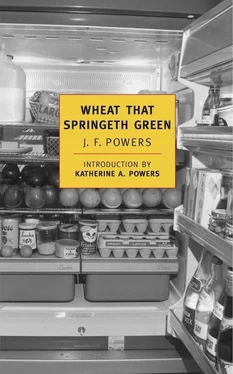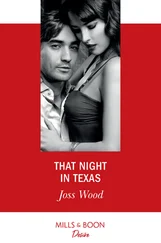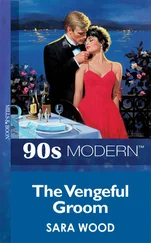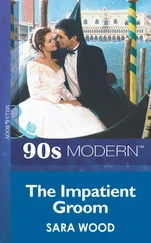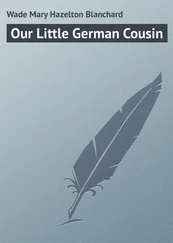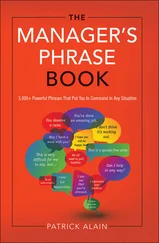“Joe, if you’re still heading east, stop and see old Tony. Watch for the blue sign. It’s right on your way, the friary.”
“Sorry, Duke. I might turn myself in.” Joe shook his head of lead.
“Morning sickness?”
“You might say.”
“Hmmm. The trouble is I already gave Tony a ring. He’s expecting you, Joe.”
“Better give him another ring, Duke.”
Duke went away, and came back, frowning. “Joe, I told him what you said, but he’s getting on, you know, and I’m afraid he’s still expecting you.”
“I’m sorry, Duke.”
An hour or so later, seeing the blue sign, Joe changed his mind, turned off the highway, and drove through woods that cried out for forestry before he came to the friary, a nondescript red-brick affair, circa 1900—and likewise Father Antoine. Joe saw him in his room, which said PROCUREUR-PROCURATOR on its door, in a chair much like Joe’s inanimate BarcaLounger in appearance. “How’s Duke keeping?” After that, to which Joe had nodded in a thoughtful manner, Father Antoine fired up his pipe, and his inquisitorial manner, in Joe’s opinion, ill became one of God’s gentlemen.
“Married, Joe?”
“No.”
“Ever been?”
“No.”
“Expect to be?”
“No.”
“Kind of work you do?”
“Oh, office work.”
“Office manager?”
“Yes. Branch office.”
“Big concern?”
“Well, we’re multinational.”
“Hah. So are we.” Father Antoine, settling deeper into his chair, blew a smoke ring. “Tired of it all, eh? You were thinking of coming in as a brother?”
Joe was thinking of kicking Duke’s ass. “Not exactly.”
Father Antoine appeared to be, if anything, more interested in Joe. “You’ve heard of our program for late vocations — to the priesthood ?”
“Can’t say I have, but it’s a thought.”
Father Antoine, just as Joe in his place might have done with a layman, let him have it. “It’s quite a thought, mister .”
“Look, Father. I’m only here to see your chair.”
“My chair ?” Father Antoine, it seemed, didn’t understand, and then, it seemed, he did. “Oh.”
“I’m sorry, Father.”
Father Antoine nodded, but more to himself. “Duke didn’t mention the chair. I somehow got the impression you were interested in… more than that. I’m sorry, Joe.”
“No, I’m sorry, Father. I’m not as concerned about missionary work as I probably should be.”
Father Antoine — he might have done something with such an admission from a layman — said: “In that case, how about a cold bottle of beer?”
“All right.”
“And while I’m up, try the chair.” While Father Antoine was up, taking two bottles out of a small brown refrigerator (“Duke gave me this”), Joe switched from an ordinary club chair to the Niagara, which Father Antoine had to turn on for him. “I don’t use the power much. Oh, sometimes at night if I can’t sleep. But you can drift off, so at night I always buckle up.”
“According to Duke,” Joe said, vibrating nicely, “the Niagara was invented in Pennsylvania and the belts under the seat run on the same principle as the ones for screening coal.”
“I wouldn’t be surprised.” Father Antoine, having polished the glasses with the skirt of his blue-black habit and poured with a practiced hand, served Joe his beer with a quivering head on it. “No, no, don’t move.”
So Joe stayed put, beer in hand, and it too now vibrating nicely. “My—” he said, and about to say curate , started over. “A friend of mine sent a check to your men somewhere in Africa — for a milch cow. They needed one. Also reading matter and T-shirts.”
“‘Milch cow’? Yes, that does sound like our Irish province — it serves Africa and Asia. But when was this?”
“A few months ago.”
“Well, if the check hasn’t cleared yet, better tell your friend to stop payment and write another. You see, we’re — they’re back in Ireland. Forced to leave by the new government.”
“Too bad.”
Father Antoine sighed. “We’re pulling in our horns these days.
“That so?”
“Yes, but there’s plenty to be done in Ireland. Oh, plenty. And on this side of the water.” Father Antoine, perhaps concerned that such candor might be shocking to a layman, was watching Joe closely.
“Here in Canada, you mean?”
“Or thereabouts. Hah.” Father Antoine clapped his glass to his mouth and finished his beer.
So Joe did the same, turned off the Niagara, and stood up with the firm intention of leaving, and held to it firmly when invited to have another “brew” (a word he disliked without knowing why), saying “Thanks, Father, but I have to drive”—sounding mealy-mouthed to himself, in view of his tolerance for alcohol (if beer could be called that), his morning-after thirst, and the old friar’s undoubtable hospitality.
“Split one then.”
“All right.”
After serving Joe (now back in the club chair) and himself, Father Antoine returned to the Niagara and spoke of the Society’s work in Latin America, which he said was going about as well as could be expected. Or not very well, Joe gathered, and was moved to sign a traveler’s check, which was gratefully accepted, and then to ease his conscience further:
“Father, there’s something I have to tell you. You know how it is when you’re traveling if you’re dressed as a priest — people pounce on you.”
Obviously Father Antoine did know — he was of a generation that hadn’t gone in for camouflage — but he said, “ ‘Pounce’? I wouldn’t say that, Joe. People generally mean well.”
“All right, Father. I don’t say they don’t. But there’s still something I have to tell you — I’m a priest myself.”
“ Are you now?” (Joe had expected more surprise, less anxiety, and thought the question loaded, that what he was really being asked was, “Are you now ?”) “Religious or secular, may I ask?”
“Secular, but in — as we say — good standing. I can show you my driver’s license”—Joe felt for his wallet—“and you can look me up in the Directory .”
“No, no, Joe, Father. I believe you. Where are you? What diocese?”
Joe told him.
“Well, you fooled me, Joe, but I will say this for myself, Father. I thought there was something funny about you right from the start, something that didn’t quite click — from what I’d been given to understand by Duke, but then… Poor Duke.”
“Yes, and I’m sorry about that, Father.”
“Joe, it couldn’t be helped, Father. No harm done. I love company these days. And now that I know where you— we —stand, there’s something I have to tell you. Duke was one of us, no, is . ‘Thou art a priest forever.’”
Joe nodded to that.
“If not perhaps”—Father Antoine sighed—“in good standing.”
“Duke just left, or what?”
“Just left. Why, I can’t say. Not women, I think, or even drink, and money’s not enough. I really can’t say.” Father Antoine sighed.
“About all you can say, Father, is there’s a lot of it going around.”
“Never heard it put so well. It’s my theory — and that’s all it is — that Duke now disapproves of himself and is trying to make amends. You’re not the first one he’s sent my way, and probably won’t be the last. (So far, no takers.) I can’t say a lot for Duke’s head, but he has a good heart. He gave me this chair.” Father Antoine sighed. “Poor Duke.”
Joe nodded to that. “He may be back.”
“My hope, of course, and speaking of that, should you ever…”
Читать дальше
